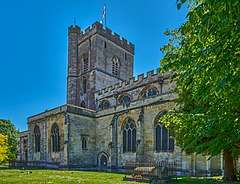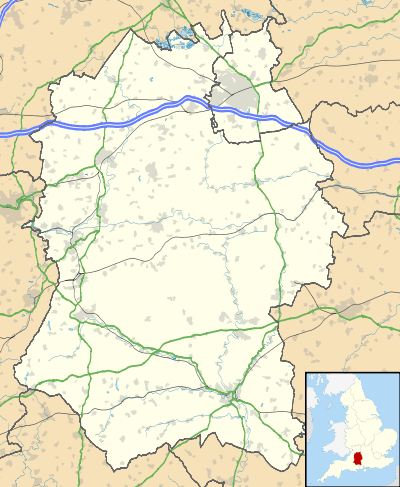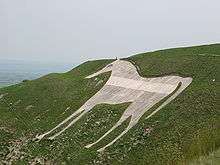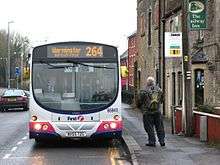Westbury, Wiltshire
Westbury is a town and civil parish in the west of the English county of Wiltshire, most famous for the Westbury White Horse.
| Westbury | |
|---|---|
 All Saints' Church, Westbury | |
 Westbury Location within Wiltshire | |
| Population | 16,989 (in 2011)[1] |
| OS grid reference | ST868511 |
| Unitary authority | |
| Ceremonial county | |
| Region | |
| Country | England |
| Sovereign state | United Kingdom |
| Post town | WESTBURY |
| Postcode district | BA13 |
| Dialling code | 01373 |
| Police | Wiltshire |
| Fire | Dorset and Wiltshire |
| Ambulance | South Western |
| UK Parliament | |
Toponymy
The most likely origin of the West- in Westbury is simply that the town is near the western edge of the county of Wiltshire, the bounds of which have been much the same since the Anglo-Saxon period.[2]
The -bury part of the name is a form of borough, which has cognates in many languages, such as the German -burg and the Greek -pyrgos. It carries the idea of a hill or fortified town. In Wiltshire, -bury often indicates an Iron Age or Bronze Age fortified hill fort, and such a site is to be found immediately above the Westbury White Horse.
Location
Westbury is in the far west of Wiltshire, close to the border with Somerset. It lies at the northwestern edge of Salisbury Plain, 18 miles (29 km) southeast of the city of Bath, approximately 5 miles (8.0 km) south of the county town of Trowbridge[2] and 4.5 miles (7.2 km) north of the garrison town of Warminster. The villages in the Westbury postal area are Bratton, Chapmanslade, Dilton Marsh, Edington, Heywood and Hawkeridge, and Coulston. Also nearby are Upton Scudamore, North Bradley, and Yarnbrook; and Rudge, Standerwick, Beckington and Frome in Somerset.
Suburbs of Westbury include Frogmore, Bitham Park, and the Ham (north and east), Chalford, Leigh Park, and Westbury Leigh (south). Westbury Leigh is sometimes considered a separate village, with its own church and chapel,[3] although it has always been within the town's boundaries.[1] Leigh Park is a large housing estate developed since the late 1990s immediately to the north of Westbury Leigh, and includes a large medical centre, a community hall, and a district centre with a Tesco Express store.
Features and history

In the past, Westbury was sometimes known as Westbury-under-the-Plain to distinguish it from other towns of the same name. Westbury is nestled under the northwestern bluffs of Salisbury Plain, and it is there that the town's most famous feature can be seen: the Westbury White Horse. It is sometimes claimed locally that the White Horse was first cut into the chalk face as long ago as the year 878, to commemorate the victory of Alfred the Great over the Danes in the Battle of Eðandun (probably, but not certainly, at the nearby village of Edington).[4] However, scholars believe this to be an invention of the late 18th century, and no evidence has yet been found for the existence of the horse before the 1720s. The form of the current White Horse dates from 1778, when it was restored. In the 1950s it was decided that the horse would be more easily maintained if it were set in concrete and painted white. The horse's original form may have been quite different from the horse seen today. One 18th-century engraving shows the horse facing to the right, but in its current form it faces to the left.
Westbury centres on its historic marketplace, with the churchyard of All Saints' Church (14th century) behind it. All Saints' has a heavy ring of bells, an Erasmus Bible, a 16th-century clock with no face constructed by a local blacksmith, and a marble bust of William Phipps by Robert Taylor. The west window of the church was donated by Abraham Laverton, who also built Prospect Square (1869) and the nearby Laverton Institute (1873), which he donated to a local charity, known today as "the Laverton". The Central Tower of the church rises to 84 feet (26 metres) in height.[5]
In the early part of September 1877, there was found on Bremeridge Farm, in the parish of Dilton Marsh, Wilts, belonging to Charles Paul Phipps, esq. of Chalcot House, a hoard of 32 gold coins. They were found during repairs and improvements of the homestead, about a foot and a half below the surface, in the courtyard, piled, one above another, without any appearance of a purse or box.[6]
Until the 1940s, the Westbury Hill Fair was an important annual event, mostly for the sale of sheep.
The town has been home to the Army Officer Selection Board and the Cadet Force Commissioning Board, located at Leighton House, since 1949. Its closure was announced in 2016.[7]
A former Lafarge cement production plant lies about 1.3 miles (2.1 km) northeast of the town centre; production ceased in 2009 but the site remains in use as a distribution centre.[8] From 1961 until its demolition in 2016, the plant's 400 feet (120 m) chimney was the tallest unsupported structure in southwestern England.[9]
Governance
The majority of local government functions (including schools, roads, social services, waste disposal, emergency planning, leisure services, development control, refuse collection and street cleaning) are carried out by Wiltshire Council, a unitary authority. Westbury is divided into three council divisions, each electing one member of Wiltshire Council.[10]
Westbury is a civil parish with an elected town council of fifteen members. This has significant consultative roles, in addition to increasing responsibility for services in the town. The chairman of the town council has the title of Mayor of Westbury which is a wholly ceremonial role. The council has taken over the running of the town's play areas, toilets and flower planting from Wiltshire Council and has supplemented reduced services from Wiltshire Council with its own staff. The council also runs the Grade II listed Laverton Institute which serves as the town hall and as a venue for events and meetings.
The parliamentary constituency of Westbury dated back to the 15th century, but the name was abandoned in 2010, when the town and most of the former constituency became part of the new South West Wiltshire constituency.
Before the parliamentary reforms of the mid-19th century, Westbury was considered a pocket borough, at one point having as few as twenty-four electors.[11] This status led to gifts to the town from the owners of the parliamentary borough, including the notable former town hall in the Market Place, donated by Sir Manasseh Masseh Lopes.
Sport and leisure
Westbury has one of the oldest working Victorian swimming pools in the country, built in 1887 by William Laverton.
Westbury has a Non-League football club Westbury United F.C. who play at the Meadow Lane ground in the Western League Division One (English football's tenth tier). The non-league Rugby Football Club (RFC), Westbury RFC, has both male and female teams who play at White Horse Country Park.
The Leighton sports field at Wellhead Lane was laid out as a cricket field by the mill-owning Lavertons. In 1890 W. G. Grace played in W. H. Laverton's XI against a team called the Australians.[12]
Education
Westbury has one secondary school, two primary schools, a junior school and an infants school.[13] The secondary school, Matravers School,[14] has a sixth form offering a range of subjects. It serves Westbury and the surrounding villages including Chapmanslade, Bratton, Dilton Marsh and Edington.
Westbury Leigh C of E Primary School was moved from Westbury Leigh to the neighbouring Leigh Park estate. Bitham Brook Primary School mainly serves the western part of the town. Westbury C of E Junior School serves the central part of the town and takes children from Year 3 to Year 6. It is fed by Westbury Infant School, which takes children from Reception to Year 2.
The closest further and higher education establishments are at Wiltshire College's Trowbridge campus, 4½ miles to the north; and the University of Bath, 18 miles to the northwest.
Transport
Road transport

The A350 road passes through the town and a controversial Westbury Bypass was once proposed which would have reduced traffic in parts of the town but would have had a negative effect on the landscape on the east of the town. The eastern bypass scheme was eventually rejected after an Independent Planning Inquiry recommended against it in 2009.[15] The town remains a bottleneck on the A350 route.
Railway transport
The town is an important junction point on the railway network, as it lies at the point where the Reading to Taunton line, forming a link from London Paddington to Penzance, intersects the Wessex Main Line, linking Bristol and Bath Spa to Salisbury and Southampton. Westbury railway station is northwest of the town centre. A smaller station, Dilton Marsh, is to the southwest of the town centre between the suburbs of Dilton Marsh and Westbury Leigh; this former "halt" is a request stop .
Media
Westbury is served by a fortnightly free newspaper, the White Horse News, named after the defining feature on the edge of the town. The newspaper is delivered to all homes in the town and the nearby villages of Bratton, Dilton Marsh and Edington, amongst others.[16] Westbury is also served by the weekly Warminster Journal and Wiltshire Times, and a radio station, The Breeze.
Notable people
- John Cogswell (1592–1669), merchant from Westbury Leigh, politician after emigrating to North America
- Thomas Phipps (c.1648–1715), merchant and briefly Member of Parliament for Westbury
- Joshua Marshman (1768–1837), Baptist missionary[17]
- John Lewis Phipps (1801–1870), coffee merchant and briefly Member of Parliament for Westbury
- Charles Paul Phipps (1815–1880), coffee merchant and Member of Parliament for Westbury
- Abraham Laverton (1819–1889), mill owner, Member of Parliament for Westbury and a philanthropist who donated many buildings to Westbury such as the Laverton Institute
- Charles Nicholas Paul Phipps (1845–1913), coffee merchant and Member of Parliament for Westbury
- Vernon Bartlett (1894–1983), journalist, author, and independent member of parliament[18]
- Penleigh Boyd (1890–1923), Australian painter[19]
See also
- List of places in Wiltshire
- List of towns in England
- Richard Bethell, 1st Baron Westbury
- Wiltshire local elections
References
- http://www.citypopulation.de/php/uk-england-southwestengland.php?cityid=E34004157
- Barfoot & Wilkes 1793, pp. 735.
- "Westbury Leigh Baptist Chapel". Wiltshire and Swindon History Centre. 6 February 2019. Retrieved 18 May 2019.
- Barfoot & Wilkes 1793, pp. 738.
- "History of All Saints Westbury". Wiltshire Council. 2011.
- Record of Gold Coin find, 1877: Wiltshire Council archives. Retrieved on 4 November 2009.
- "Thousands of new homes to be built as MOD releases more sites". MoD. 24 March 2016. Retrieved 26 August 2016.
- James Williams (1 May 2009). "Lafarge cements a place in county's history". Wiltshire Times. Trowbridge, UK. Retrieved 28 June 2015.
- Mackley, Stefan (18 September 2016). "Westbury chimney: Emotions run high following demolition". Wiltshire Times. Retrieved 18 September 2016.
- "Your Wiltshire Councillors by Division". Wiltshire County Council. 2011. Retrieved 9 February 2013.
- Stephen Farrell. "Westbury". The History of Parliament Trust. Retrieved 9 February 2013.
- Simon Rae, W. G. Grace: a Life (2012), p. 4
- "Schools in Westbury, Wiltshire". www.alltheschools.com. Retrieved 11 March 2018.
- http://www.matravers.wilts.sch.uk/
- Westbury Bypass Decision: DCLG letter, Campaign for Better Transport website (PDF file). Retrieved on 3 November 2009.
- "About White Horse News". Wiltshire Publications Ltd. Retrieved 9 February 2013.
- The Story of Serampore and its College (Council of Serampore College, 4th ed., 2006)
- Papers of Vernon Bartlett, at archiveshub.ac.uk, accessed 30 November 2012
- The Riverside Dictionary of Biography (American Heritage Dictionaries, 2004, ISBN 0618493379), p. 107
Bibliography
- Barfoot, Peter; Wilkes, John (1793), The Universal British Directory of Trade, Commerce, and Manufacture, 4, British Directory Office, retrieved 9 February 2013
- Wiltshire County Council Website page on Westbury, retrieved 18:50 Oct 29, 2004 (UTC)
- ThisisWestbury.co.uk: Westbury's history website
External links
| Wikimedia Commons has media related to Westbury, Wiltshire. |